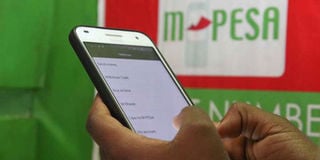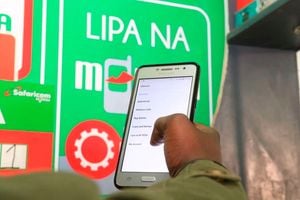
A customer withdraws money from an M-Pesa shop. Banks to pay for money sent to till numbers that end up with them.
Banks will be held responsible for loss of cash erroneously sent by clients to unintended Safaricom M-Pesa tills numbers, which terminate into accounts held by the lenders.
The High Court has held that banks will have to demonstrate that they took all the “necessary steps in recalling the money” to stop their clients from illegally profiting from such erroneous transactions or be held liable for the losses suffered by affected M-Pesa users.
This could open up banks to thousands of lawsuits involving M-Pesa customers who accidentally send money to the wrong till numbers terminating in banks and end up losing the money amid the tedious process involved in requesting for reversals.
Safaricom has over 606,000 enterprises using its payment service, Lipa na M-Pesa, to accept payments for goods and services, pointing to the popularity of the service that transacted Sh1.63 trillion in the financial year ending March 2023.
The High Court on March 15 upheld the decision of the Small Claims court in which a customer successfully sued Kingdom Bank after losing Sh50,600 he erroneously credited to an M-Pesa till number that terminated in an account domiciled at the bank. The court held that the bank was liable for the loss.
The High Court judge ruled that despite Kingdom Bank having demonstrated that money was withdrawn before the affected customer reported the erroneous transaction, it failed to show that it tried following up with the customer who withdrew the money to stop the fraud.
“The bank was under a duty to demonstrate that it took the necessary steps in recalling the money. However, all that the bank did was to file statements to show how the transaction was undertaken or how the money was withdrawn. There was nothing to show that the bank called for the money from its customer. No evidence of its intention to aid the recovery of the money,” said the judge.
“While I admit that the bank has a duty to protect its customer’s interests, in this case, the customer fraudulently withdrew money that did not belong to it. The bank had a duty to ensure that it did not aid a fraud and it is not enough to state that the account did not have sufficient funds.”
The High Court finding now raises the bar of the responsibility of banks in protecting the interests of customers who are not even their own.
Currently, M-Pesa customers who send money to the wrong till numbers have to plead with the recipients to reverse the money. The service was introduced by Safaricom in 2013 as a safe way for businesses or individuals to receive payments without the risk of customers initiating reversals from the telco.
The arrangement however exposes to losses customers who make payments to wrong till numbers or overpay businesses.











